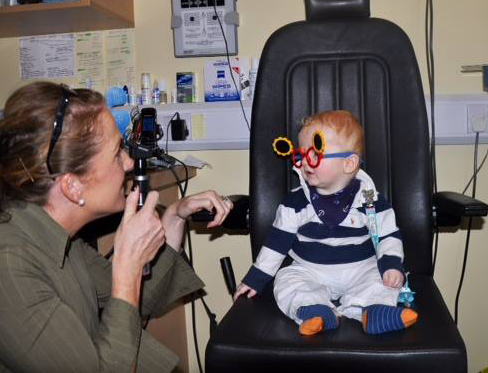Eye Examinations

Eye examnations are usually a fun experience for children in Concannons. The child usually doesn’t want to leave the exam chair at the end! They seem to enjoy the technology, measurements and especially loveseing what the inside of their eyes look like. Our exmas are tailored to the age of the child so they do not have to be able to read or talk to be able to perform I the room. Our mantra for the last 20 years “3’s and 5;s should test their eyes”
-
YOUNG EYES AND DIGITAL DEVICES
We are asked on a daily basis by parents concerned about their children's device usage “How much time should my children spend on their device? Is it bed for their eyes?". Hence we decided to put this information sheet together. It summarises the effect of digital devices on the eyes, esp. relating to younger eyes (i.e. under 18yrs of age).
By Digital devices we include: desktops, laptops, tablets, Nintendo’s, iPads, phones, kindles....(I am sure I have left something out but you get the idea!).
The two main effects of excessive use to the eyes are 1) Possible development of myopia (short-sightedness) and 2) Dry eyes.
Let's deal with these individually.
-
MYOPIA
A devastating negative effect of all this screen use is the growing incidence of Myopia/Short-sightedness we are seeing in children and teenagers.
Myopia (aka short-sightedness), where the child's distance vision is blurred, has always been around but its incidence is reaching epidemic proportions in recent years. It is predicted that by 2050 half the world’s population will be short sighted.
We are seeing myopia starting earlier in children than ever before. Once it starts, there is no reversal/going back. The earlier the child becomes myopic, the more myopic they will become. This myopia worsens with increasing use of eyes for near vision.
So put simply, if your child is short sighted, their short-sightedness is going to worsen(increase) the more time they spend on near visual tasks (phones, iPad, books etc).
If your child is not yet short sighted but one/both of their parents are, then they are increasing their chances of becoming short sighted (sooner) by excessively using their eyes for near visual tasks (as above).
Lastly, we are seeing children/teenagers becoming short sighted, even with no family history of myopia BECAUSE of excessive use of their eyes for near vision. Noticing a running theme here?
We cannot stop our children using these devices (believe me, I have tried!) BUT we can help develop good habits by restricting time spent on them in one sitting. Regular breaks are key here. Every 20 mins, we recommend a break for a minute or two. We recommend the child looks away and changes their focus into the distance. The child needs to use their eyes regularly and often for distance viewing. If they don't use their distance vision they are at risk of losing their distance vision. We advise limiting near tasks (after school work) to 2 hrs a day maximum. Ensure there is an equal balance between inside and outdoors time. Less screen time , more green time. Children who spend a lot of time outdoors are much less likely to become short-sighted.
Why are we interested in controlling/slowing myopia progression?
While the eye is becoming more short-sighted, its actually growing and stretching at the back. The more myopic, the more stretched the eye is.
The retina (film on the inside of the eye) is the size of a postage stamp so as it stretches it becomes weaker and more vulnerable.
The greater the amount of myopia, the greater the risk of Cataracts, Glaucoma, retinal detachments and other sight threatening eye diseases at a later stage.
So it is our duty as eye care practitioners to educate and inform our myopic patients/their parents of the HIGH RISK of potential vision loss and to do all we can to prevent/slow the progression of this condition Myopia.
If your child has progressing MYOPIA (i.e. distance vision getting worse at each eye examination) there are successful treatments available. Please phone 091-586748 for advice and information.
-
DRY EYES
When we use digital devices e.g. iphones or ipads etc we blink less. We tend to stare at the screen. When we blink we provide fresh tears/lubrication to our eyes. So when we blink less, our eyes get dry. Dry eyes feel scratchy, itchy, irritated and red.
So using a preservative free lubricating drops e.g. Hylodual, the eyes will feel much better and moist.
